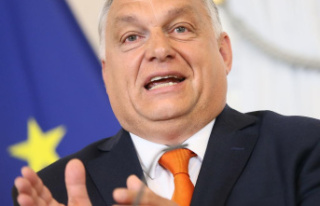The debate about postponing the phase-out of nuclear power, which has been deadlocked for weeks, is gaining momentum. According to research by the German Press Agency, several EU countries are pushing for the use of nuclear power in Germany beyond the legally stipulated end date of December 31.
In view of the gas crisis, there are also calls to check whether the reactors that were last taken off the grid should be restarted.
While this gives support for advocates of longer terms, for example in the CDU, CSU and FDP, a new legal opinion raises doubts about the safety assessment of the Isar 2 kiln in Bavaria.
From the point of view of countries such as Hungary, Romania, Slovakia and France, the continued operation of German nuclear power plants could make a significant contribution to saving gas, since around 15 percent of Germany's electricity was still generated by gas-fired power plants. If Russia cuts off all gas supplies to the EU, more reserves would be available for domestic and industrial heating. The background to the demands is the EU emergency plan for the gas crisis. He plans to reduce national consumption by 15 percent from August to March.
Warning of another postponement of the nuclear phase-out
Environmental organizations such as the Bund Naturschutz (BUND) and Greenpeace, on the other hand, warn against another postponement of the nuclear phase-out and point to incalculable security risks. After an expert opinion by TÜV Süd on behalf of the Bavarian Ministry of the Environment, which became known in mid-June, declared no concerns about continued operation, a new legal opinion now accuses TÜV Süd of bias.
Specifically, the Hamburg law firm Michael Günther, in its 21-page statement, which is available to the German Press Agency and was prepared on behalf of Greenpeace Germany, accuses TÜV Süd of "sloppily arguing commissioned work" that "cannot be recognized as a serious assessment ". The impression also arises that the TÜV ignores the applicable nuclear law.
The TÜV rating was "apparently intended for use as a weapon in the current discussion about extending the service life in the political arena," it said. TÜV Süd certifies what the client wants. "Regardless of the condition and without checking the nuclear power plant, the result is already clear for the TÜV," said Heinz Smital, nuclear physicist and Greenpeace nuclear expert. There is a suspicion "that a courtesy report has been prepared here," according to the lawyers.
The Bavarian Ministry of the Environment immediately rejected the accusation: "TÜV Süd is one of the most renowned experts and one of the most familiar with nuclear power issues," said a spokesman. The TÜV report deals with central safety issues of a limited term extension and comes to a clear conclusion. It is not clear where a higher expertise of a Hamburg law firm in nuclear technology derives from.
With a view to the ongoing debate about impending energy bottlenecks, Smital emphasized: "The nuclear power plants are a safety risk and will not help in the event of a possible gas shortage in the coming winter." Nuclear power is too cumbersome to absorb power peaks. Instead of relying on more nuclear power, it must be about using energy sparingly.
Longer terms: Investigations into the meaning and possible risks
In March 2022, the Federal Ministries for Economic Affairs and the Environment had already spoken out against the continued operation of the last German reactors. In the meantime, the Federal Ministry of Economics has announced further investigations into the sense and possible risks of a longer service life for nuclear reactors. The results are expected to be presented in the coming weeks.
On Thursday, the Federation for the Environment and Nature Conservation in Germany (BUND) presented a study that categorically rejected the continued operation of nuclear power plants. The benefits are out of all proportion to the risks and costs. The safety checks carried out last in 2009 were based on a set of rules from the early 1980s, in which the nuclear accidents in Chernobyl and Fukushima were not even taken into account.
There are currently three nuclear power plants still connected to the grid in Germany: Emsland in Lower Saxony, Isar 2 in Bavaria and Neckarwestheim 2 in Baden-Württemberg. According to current law, they must be switched off by December 31, 2022 at the latest. In the federal government, the Greens are against a far-reaching extension of the term. The only option seen is to operate the nuclear power plants that are still in operation longer with the remaining fuel elements. The Isar 2 nuclear power plant could continue to run until the summer of 2023.












